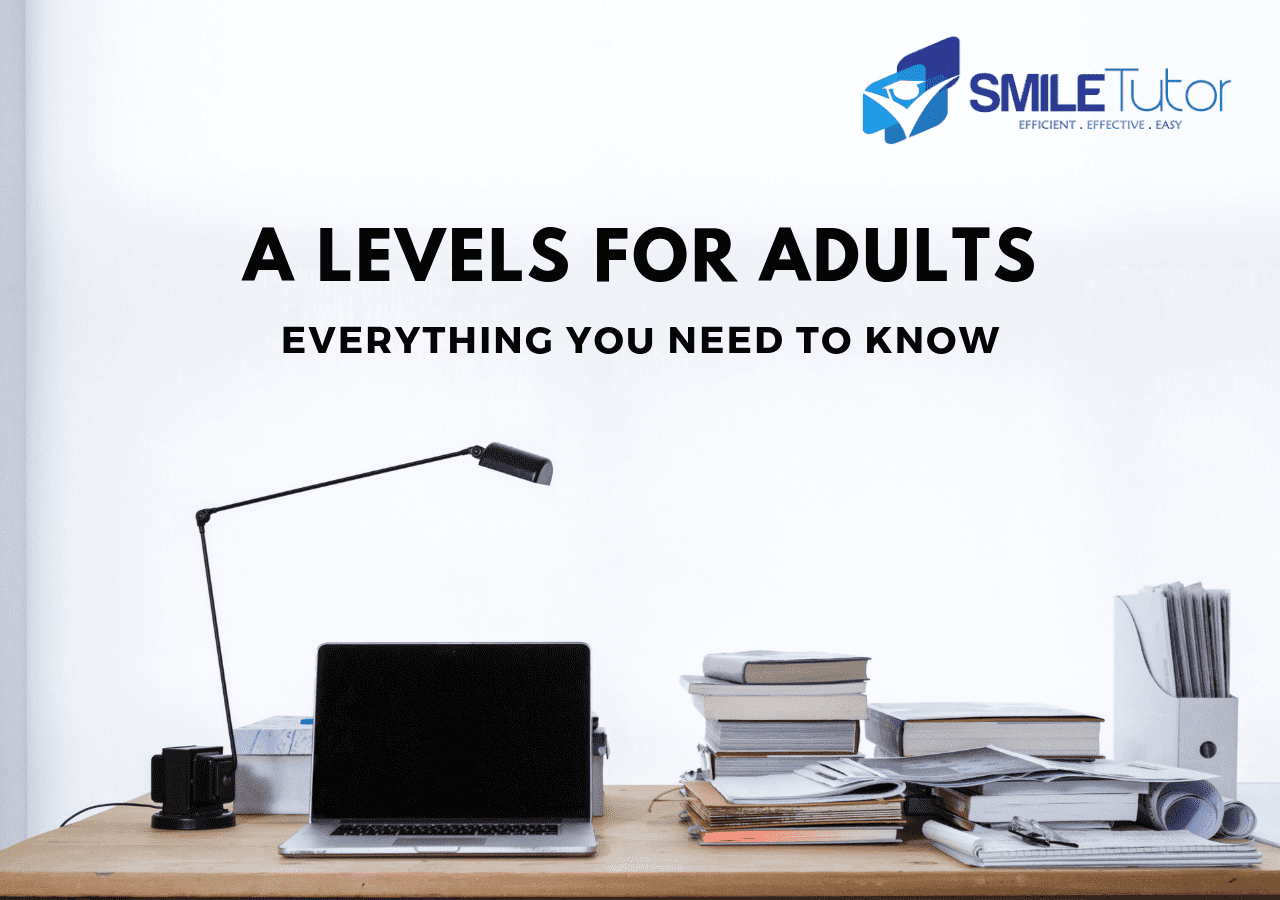
The GCE Advanced Level (A level) qualification is the shortest and most direct route to university. It’s sought after not only by students that have graduated from secondary school, but adults too.
Yes, A levels for adults is common.
Judging by the demand for A Level tuition for adults, I understand that this is a popular option for just anyone who wants to obtain a degree. If you belong in this group, there are probably many questions that you are grappling with – how to register for A levels, what subject combinations to take, and how to overcome the challenges of studying A levels at home.
Take a deep breath and let me guide you through it, step by step.
A levels for adults: Should I do it?

First things first, should you even attempt doing A levels at home?
It’s safe to say that private A level candidates will have many more challenges to overcome, especially when compared to a JC student. Those kids will have two years totally focused on A level preparations. They will have access to classes, teachers, and subject-related resources.
I don’t mean to discourage you, but this is the reality.
A levels for adults will not be easy. Therefore, you need to be a 100% certain that there’s no better option for you out there. To do this, you should have a clear idea of what you want to do with your A level certification. Yes, you want a degree, but in what field, and in what university?
Do thorough research and list down your desired courses. Then, check the entry requirements. Not all degree courses require A level passes.
Most of them also accept students with:
- A diploma in a related field
- Other qualifications awarded by recognised institutions
- Relevant working experience
If you are able to qualify through your working experience, then you should certainly go ahead and apply. Otherwise, you should also ask yourself… why not a diploma?
With O levels or NITEC qualifications, you can progress to getting a diploma. Degree holders are able to command a higher salary than diploma holders, but hey, getting a diploma is still a positive step forward. You’ll be able to gain useful and applicable knowledge that is very much in demand within the workforce. And when you’re ready after a few years of work, you can move on to a university, gaining admission based on your diploma.
Many adults who are keen to jump into doing A levels instead of getting a diploma are impatient to reap the rewards of a degree. This is absolutely understandable in today’s highly competitive society. Also, it’s not always a bad move.
If you believe that you can score well after studying A levels at home or going through adult A level courses, then go ahead.
Let’s get into the logistics.
A Level registration and important dates
A Level registration for private candidates opens in March.
This year, it is between 7 March to 27 March through the SEAB internet Examination Registration System (iERS).
During the time of registration, you’ll have to pay for the examination fees, which comprises both the basic fee and subject fee.
The basic fee per subject would be $64 for Singapore citizens, $80 for Singapore PRs and $100 for international students. The subject fee, on the other hand, varies between $88 to $156 for Singapore citizens, and between $200 to $350 for Singapore PRs and international students.
As for exam dates, it’s possible to sit for Mother Tongue languages mid-year, between June to September. Examinations for other subjects take place from late October to early December. You may find the A level exam schedule for 2019 here.
Results are released in March the following year.
For more information, peruse through the instructions for private candidates on SEAB’s website.
Choosing A level subjects
Now, on to the next question: what A level subjects to take, and at what level?
Again, this depends on your ultimate goal.
Private A level candidates can be examined on subjects at two levels: Higher 1 (H1) or Higher 2 (H2). They can take a maximum of 5 H1 subjects and 3 H2 subjects OR 3 H1 subjects and 4 H2 subjects. At least one of four subjects need to come from a contrasting discipline – for example, if three subjects are in the “‘Humanities and the Arts” group, there should be one in the “‘Mathematics and Sciences” group.

Here are some of the common subjects available:
- General Paper
- Mathematics
- Biology
- Chemistry
- Physics
- Economics
- Geography
- History
- Principles of Accounting
- Literature in English
- Chinese Language
- Malay Language
- Tamil Language
To qualify for universities like NUS, NTU and SMU, your best bet is to obtain good passes in:
- 3 H2 content subjects
- 1 H1 content subjects
- General Paper (GP) or Knowledge & Inquiry (KI)
You may also need to meet the minimum Mother Tongue Language requirements either for the A levels or the O levels.
Private universities, on the other hand, have varying acceptance criteria. There are courses that accept candidates who have sat for 2 or 3 A level subjects, while there are others with minimum grades for specific subjects related to the course.
Therefore, do your due diligence in determining what subjects to take. You don’t want to waste time on studying for unnecessary subjects, and neither do you want to miss the A level registration for subjects that are crucial for admission.
Setting up a timeline for undertaking private A levels

Don’t underestimate the time you need to prepare for the A levels.
If you have ongoing commitments like work, you need to seriously consider leaving your job to free up your time. At the very least, you’ll need ten months of full-time studies to be ready.
Adult learning A levels part-time is not unheard of. However, without any luxury of time, the challenges are multifold. You’ll have to be quite the superman (or superwoman) to juggle work and private A level preparations at the same time.
Remember that most students dedicate two whole years of their lives just for the A levels – and you’re competing with them.
Studying A levels at home
Is studying A levels at home a wise plan?
I’m talking about independent study or self-learning – without teachers, and without institutions.
It’s possible, yes, but it’s very challenging.
First of all, you’ll need to go through the A-Level examination syllabuses for all the subjects you are taking. Then, you’ll need to have study resources.
It’s best to seek out a friend or acquaintance who is currently enrolled in a JC to find out the textbooks that schools use to teach each subject. Then, hit up the bookstore to make your purchases. Don’t forget assessment books too. Even better if you can find lecture notes and exam papers from students.
Just make sure that all the resources you’ve obtained are up to date. Exam syllabuses do change from time to time, and so do the contents of the study materials.
Once you have what you need, you should draw up a study plan. This is important for A level private candidates who will not have teachers to pace them. Make goals on how many topics to cover per subject within a duration of time, and stick to it.
Also, don’t forget that science subjects have practical lab sessions! You could watch videos and use your imagination, but if you want easy access to a science lab for hands-on lessons, then being enrolled in a private institution (more on that later) will be advantageous.
Adult A level tuition
If you’ve decided on studying A levels at home, it’s a very good idea to hire an A level tutor with SmileTutor for one-on-one lessons.
You should even consider requesting for a current or ex-MOE teacher as they are in the best position to push you towards a good score for the A level exams. Even though their rates are higher than tutors without a background of teaching in schools, they could very well be worth it.
A good tuition teacher will guide you along the study journey, giving you nudges whenever you need to buckle up. They can set up customised lesson plans, share resources, and keep you on track for revisions. They also know what to look out for with regards to the marking scheme.
Adult A level courses
Another option for private candidates would be adult A level courses. This would be akin to enrolling in a JC, where you’ll attend classes with other private A level candidates.

There are one year A level courses, such as those offered by DIMENSIONS International College and Spring College International. SmartLab Education Private School has a 10-month accelerated course. The A level preparatory courses offered by MDIS college run for either 10 or 16 months, while the one by Shelton College runs for two years.
The options for part time A level courses are less numerous. BMC International College conducts weekend and weekday evening A level courses that stretch for 10 months. They are for a select few subjects like General Paper, Maths, Economics, Chemistry and Physics. Inspire Education Centre accepts part-time students who’ll come in for three-hour classes, twice a week for ten months.
The downside of these adult A level courses would be the lack of flexibility, in that you need to attend scheduled classes. The cost is also significant: full-time adult A level courses can range anywhere from $8,000 to $18,000.
The upsides? Your lessons will be exam-focused, you will study alongside other students, and you’ll receive resources and materials. These are all greatly beneficial in tackling A levels for adults.
Online A level courses
If you are in the search for online A level courses, I’m sorry to disappoint.
There isn’t any distance learning A levels course or fast track A levels course that is geared towards Singapore’s A levels. If you find one, chances are, it is catered to students sitting for the British A levels.
And yes, these two are different!
Singapore’s A levels have been de-linked from the UK ones since 2002. That’s 17 years ago. It’s also no secret that the A levels in Singapore are more difficult than the one in the UK.
The realities of being an A level private candidate

I’ve emphasised the difficulty of A levels for adults a few times in this article.
I do this to ensure that you’re fully aware of what you’re getting yourself into. Adults who are diving into private A levels may be out of touch with the demands of studying. Even things like sitting behind a desk for an hour to revise could be difficult. Then, there’s that issue of getting quality resources if you’re studying A levels at home, which I’ve already touched on.
Failing A levels is a very real possibility faced by many students, even those who are enrolled in a JC. As a private A level candidate, you’ll need to go the extra mile to ensure that your time, money and efforts will not go to waste.
However, with lots of dedication and perseverance, you can definitely succeed in winning at A levels for adults. With that, I’d like to wish you the very best.
